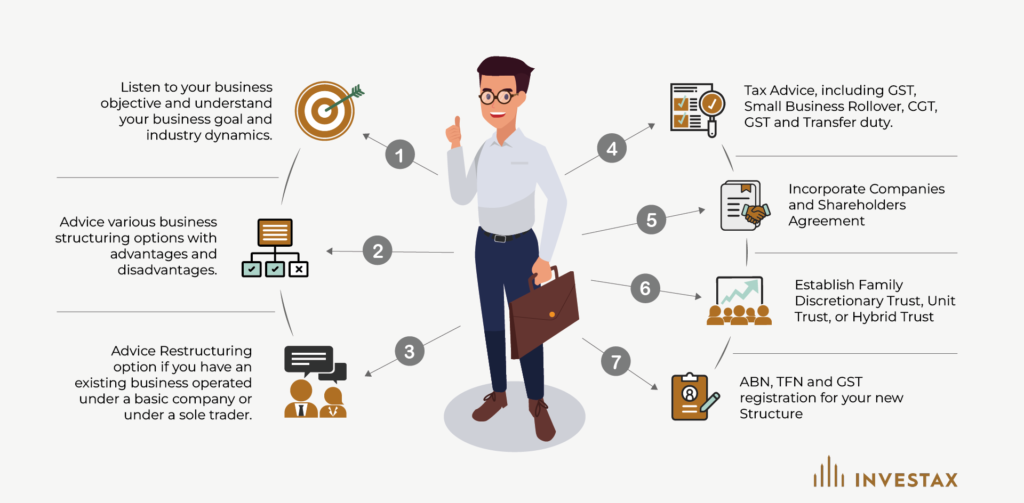Before hastily creating a company or a sole trader ABN to run your business, it is crucial to pause and consider the significance of a well-thought-out business structure. Choosing the right structure for your business can make all the difference between long-term success and unnecessary complications.
Considerations for Business Structure
There is no one-size-fits-all structure suitable for every business.
When determining the best business structure, asset protection, and tax planning usually take precedence.

Several factors come into play when establishing a business and selecting the optimal structure, including:
- The financial positions and personal situations of the business owners.
- The short-term and long-term objectives of the owners.
- The number of business owners, including the potential for additional owners in the future.
- The level of risk associated with business activities.
- The expected profitability of the business.
- Tax implications for both the business and its owners concerning trading profits and capital gains from business sales, shares, or units.
- The industry in which the business will operate.
Getting the right structuring in place, along with associated structuring agreements, at the earliest stages can yield significant benefits, particularly in the unfortunate event of business failure or insolvency.
At Investax, we understand the importance of strategic business structuring, and we are here to guide you through the process. By carefully examining your business goals, industry landscape, and legal requirements, we help you lay a solid foundation for your venture. Don’t underestimate the impact of a well-designed business structure—it can optimize your operations, protect your assets, streamline your financials, and position your business for sustained growth.


How do I choose the right business structure in Australia?
Choosing the right structure depends on factors like the nature of your business, liability preferences, tax implications, and future growth plans. Consult with a business advisor or accountant for personalized advice.
What is the most common business structure in Australia?
The most common business structure in Australia is the sole trader structure, followed by companies, Trust and partnerships. The choice of structure depends on factors like liability, taxation, and business goals.
What are the tax implications of different business structures in Australia?
Tax implications vary by structure. Sole traders report business income on their individual tax return. Companies pay tax on their profits at the corporate tax rate. Partnerships and trusts distribute profits to partners or beneficiaries who report them on their individual tax returns.
Can I have more than one business structure for different parts of my business?
Yes, it is possible to have multiple business structures for different aspects of your business, such as a company for one division and a trust for another. Each structure will have its own legal and tax implications.
Why should I use a company or a trust structure for my business over a sole trader or partnership structure?
Choosing a company or trust structure for your business over a sole trader or partnership offers several advantages. These structures provide limited liability, protecting your personal assets from business debts, making them appealing for risk management. Trusts, particularly discretionary trusts, offer tax efficiency through income distribution among beneficiaries. They also serve well for asset protection and estate planning, allowing for the orderly transfer of assets. Companies, with separate tax rates and perpetual existence, are attractive to investors and convey professionalism, while also facilitating business continuity and scalability. Depending on your specific business goals, legal requirements, and financial situation, consulting with experts such as accountants or legal advisors can help determine the most suitable structure for your needs.
What and Who is a Settlor?
The Settlor is the individual who “settles” a discretionary trust by transferring the settled sum to the Trustee (or Trustees). The Settlor must also actually transfer the settled sum. If they fail to do so, the Trust will not come into existence. For a trust to be established, there must be trust property. In most situations, this trust property originates from the settled sum.




